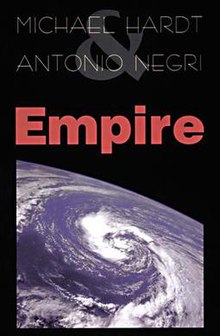The following outline is provided as an overview of and topical guide to critical theory:
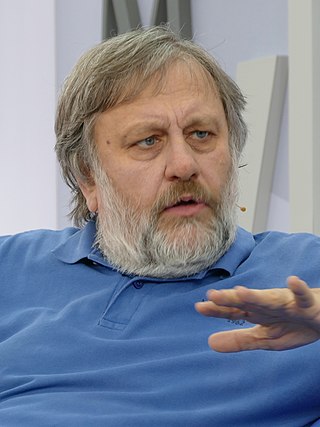
Slavoj Žižek is a Slovenian philosopher, cultural theorist and public intellectual. He is international director of the Birkbeck Institute for the Humanities at the University of London, visiting professor at New York University and a senior researcher at the University of Ljubljana's Department of Philosophy. He primarily works on continental philosophy and political theory, as well as film criticism and theology.

Antonio Negri was an Italian political philosopher known as one of the most prominent theorists of autonomism, as well as for his co-authorship of Empire with Michael Hardt and his work on the philosopher Baruch Spinoza. Born in Padua, Italy, Negri became a professor of political philosophy at the University of Padua, where he taught state and constitutional theory. Negri founded the Potere Operaio group in 1969 and was a leading member of Autonomia Operaia, and published hugely influential books urging "revolutionary consciousness".

Fredric Jameson is an American literary critic, philosopher and Marxist political theorist. He is best known for his analysis of contemporary cultural trends, particularly his analysis of postmodernity and capitalism. Jameson's best-known books include Postmodernism, or, The Cultural Logic of Late Capitalism (1991) and The Political Unconscious (1981).
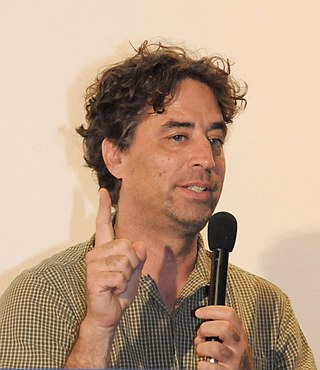
Michael Hardt is an American political philosopher and literary theorist. Hardt is best known for his book Empire, which was co-written with Antonio Negri.

Ernesto Laclau was an Argentine political theorist and philosopher. He is often described as an 'inventor' of post-Marxist political theory. He is well known for his collaborations with his long-term partner, Chantal Mouffe.
Multitude is a term for a group of people who cannot be classed under any other distinct category, except for their shared fact of existence. Though its use dates back to antiquity, the term first entered into the lexicon of political philosophy when it was used by figures like Machiavelli, Hobbes, and most notably, Spinoza. The multitude is a concept of a population that has not entered into a social contract with a sovereign political body, such that individuals retain the capacity for political self-determination. A multitude typically is classified as a quantity exceeding 100. For Hobbes the multitude was a rabble that needed to enact a social contract with a monarch, thus turning them from a multitude into a people. For Machiavelli and Spinoza both, the role of the multitude vacillates between admiration and contempt. Recently the term has returned to prominence as a new model of resistance against global systems of power as described by political theorists Michael Hardt and Antonio Negri in their international best-seller Empire (2000) and expanded upon in their Multitude: War and Democracy in the Age of Empire (2004). Other theorists recently began to use the term include political thinkers associated with autonomist Marxism and its sequelae, including Sylvère Lotringer, Paolo Virno, and thinkers connected with the eponymous review Multitudes.

John Holloway is a Marxist-oriented lawyer, sociologist and philosopher, whose work is closely associated with the Zapatista movement in Mexico, his home since 1991. It has also been taken up by some intellectuals associated with the piqueteros in Argentina; the Abahlali baseMjondolo movement in South Africa and the Anti-Globalization Movement in Europe and North America. He is currently a professor at the Institute for Humanities and Social Sciences at the Autonomous University of Puebla.
Autonomism, also known as Autonomist Marxism, is an anti-capitalist social movement and Marxist-based theoretical current that first emerged in Italy in the 1960s from workerism. Later, post-Marxist and anarchist tendencies became significant after influence from the Situationists, the failure of Italian far-left movements in the 1970s, and the emergence of a number of important theorists including Antonio Negri, who had contributed to the 1969 founding of Potere Operaio as well as Mario Tronti, Paolo Virno and Franco "Bifo" Berardi.
Open Marxism is a critical Marxist school of thought which critiques state socialism and party politics, stressing the need for openness to praxis and history through an anti-positivist method grounded in the "practical reflexivity" of Karl Marx's own concepts. The "openness" in open Marxism also refers to a non-deterministic view of history in which the unpredictability of class struggle is foregrounded.
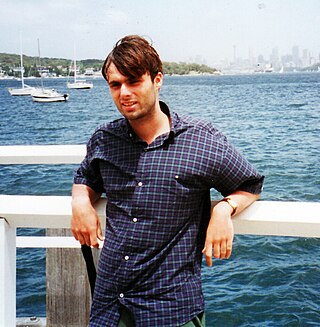
Jason Barker is a British theorist of contemporary French philosophy, film director, screenwriter, and producer. He is a professor of cultural studies at Kyung Hee University in the Graduate School of British and American Language and Culture, and visiting professor at the European Graduate School, where he teaches in the Faculty of Media and Communication alongside Alain Badiou, Judith Butler, Jacques Rancière, Avital Ronell, Slavoj Žižek, and others.
Alan Johnson is a British political theorist and activist. He is a senior research fellow at the Britain Israel Communications and Research Centre. Previously he was Professor of Democratic Theory and Practice at Edge Hill University.
Gopal Balakrishnan was a professor in the History of Consciousness Department at the University of California, Santa Cruz, until he was fired due to allegations of sexual assault.
This is a list of articles in continental philosophy.
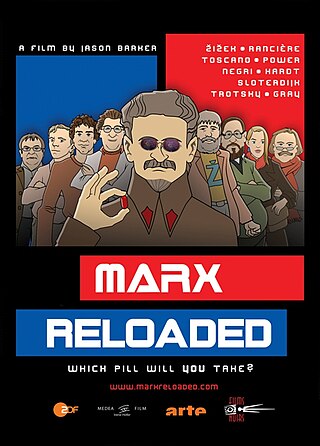
Marx Reloaded is a 2011 German documentary film written and directed by the British writer and theorist Jason Barker. Featuring interviews with several well-known philosophers, the film aims to examine the relevance of Karl Marx's ideas in relation to the Great Recession. The film's title is a wordplay on The Matrix Reloaded, the sequel to The Matrix, which is parodied in the documentary.
According to the political theorist Alan Johnson, there has been a revival of serious interest in communism in the 21st century led by Slavoj Žižek and Alain Badiou.
A. Kiarina Kordela (; is a Greek-American philosopher and critical theorist. She is a professor of German Studies and founding director of the Critical Theory Program at Macalester College in Saint Paul, MN.
Post-Marxism is a perspective in critical social theory which radically reinterprets Marxism, countering its association with economism, historical determinism, anti-humanism, and class reductionism, whilst remaining committed to the construction of socialism. Most notably, post-Marxists are anti-essentialist, rejecting the primacy of class struggle, and instead focus on building radical democracy. Post-Marxism can be considered a synthesis of post-structuralist frameworks and neo-Marxist analysis, in response to the decline of the New Left after the protests of 1968.

The following outline is provided as an overview of and topical guide to Marxism:

The Peterson–Žižek debate, officially titled Happiness: Capitalism vs. Marxism, was a debate between the Canadian psychologist Jordan Peterson and the Slovenian philosopher Slavoj Žižek on the relationship between Marxism, capitalism, and happiness. Moderated by Stephen J. Blackwood, it was held before an audience of 3,000 at Meridian Hall in Toronto on 19 April 2019.
